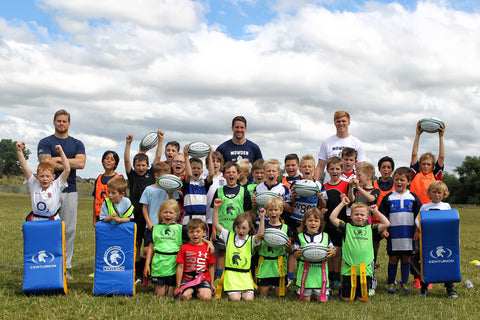Rugby Blog
7 Rugby Coaching Tips for Parents
by Leana KellIf you're a parent considering becoming a rugby coach for your son or daughter's team, you might be wondering whether you're cut out for the role. Perhaps you're a rugby novice but you love sport, or you used to play rugby in your teens, but haven't picked up the game since.
Centurion can assure you that you don't have to be a rugby expert to provide rugby coaching drills to under 9s. Most parents who are enthusiastic, energetic and willing to follow some simple rules can find success on the junior rugby pitch.
Coaching a junior rugby team can be highly rewarding, providing you go into it with your eyes wide open. Below Centurion outlines some important points to consider, if you're thinking about becoming a Junior Rugby Coach.
1. Don't think too big
Being a Junior Rugby Coach means you'll need to think small... initially. Rugby coaching for under 9s is a non-contact sport. You'll be teaching children the fundamental skills associated with rugby but without the contact. You're not training them for the next Rugby World Cup, you'll have to save those aspirations for when they are older. For now, focus on getting children's interest in the game up. The best way you can do this is to be patient, enthusiastic and driven.
2. Patience is a virtue
Children have a large capacity to learn, but their knowledge of the rugby pitch will not develop overnight, and each week they may forget what was taught to them the week before. That's where repetition is the key to good rugby coaching. Repeat what you coach every week and slowly but surely you will begin to see small improvements in players. For example, with passing, the key elements might be introduced in week one, then will need practising in some form every session for the next month to see any significant change.
3. Less chat
The concentration span of youngsters is short, and most children will lose interest very quickly if you continue to talk at them for long lengths of time. The key is to talk less and focus on a ratio of doing and talking that is within the region of 5:1. If you need to stop the players and say anything, say it once, repeat it once then move on.
4. Maintain a shared voice
Most junior rugby teams will have more than one coach. If you are a parent you are most likely to have taken a semi-assistant role. The danger of having several 'coaches' is that the message can get confused amongst lots of well meaning comments that are coming from different voices. Before each session, agree who is the lead coach and decide what is going to be said so that everyone has the same stance. If you are an assistant coach, follow the lead coach's comments and encourage and reiterate them throughout the session.
5. Remember your audience
Always be mindful of the age of your audience. Junior matches often take place in a small area of a much larger rugby pitch, to ensure players do not tire too quickly during a match. Practices should also reflect this. Cut down on the distances covered in rugby training drills, otherwise you'll find a split occurs between those children who can keep up and those who can't.
6. Introduce rewards
Rewards can make a huge difference to the behaviour and level of concentration in young rugby players. Even rewards such as a small bar of chocolate can be effective in encouraging the weakest players to try their very hardest. Only have 2-3 rewards each week so that the players have to work hard to get one, but share the rewards around during the season, providing the receivers are putting in the work. Change the nature of the awards each week, for example, one week could be a reward for the most improved tackler, the next, the hardest worker at rugby drills etc.
7. Leave emotions at home
Avoid getting emotionally involved, do not let the ups and downs of your team affect you, and any individual cases. In addition, do not allow the voices of parents to affect the way you run the training session. Sideline parents are prevalent in any sport and you have to learn to take the corporate view, especially when a parent might be telling their child to perform differently.





